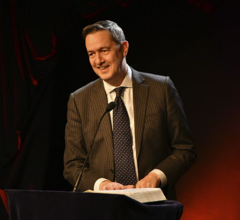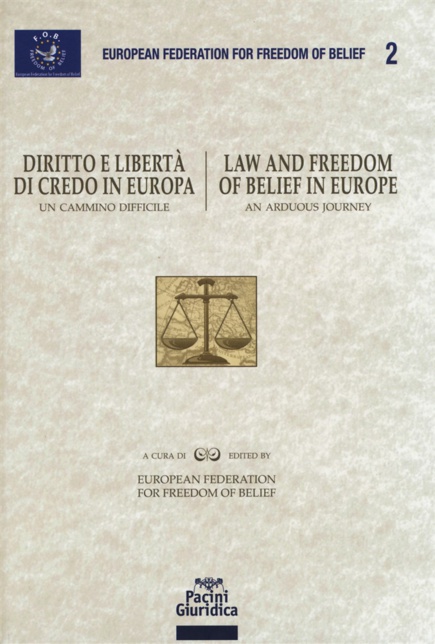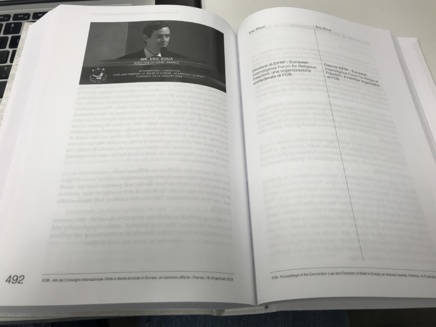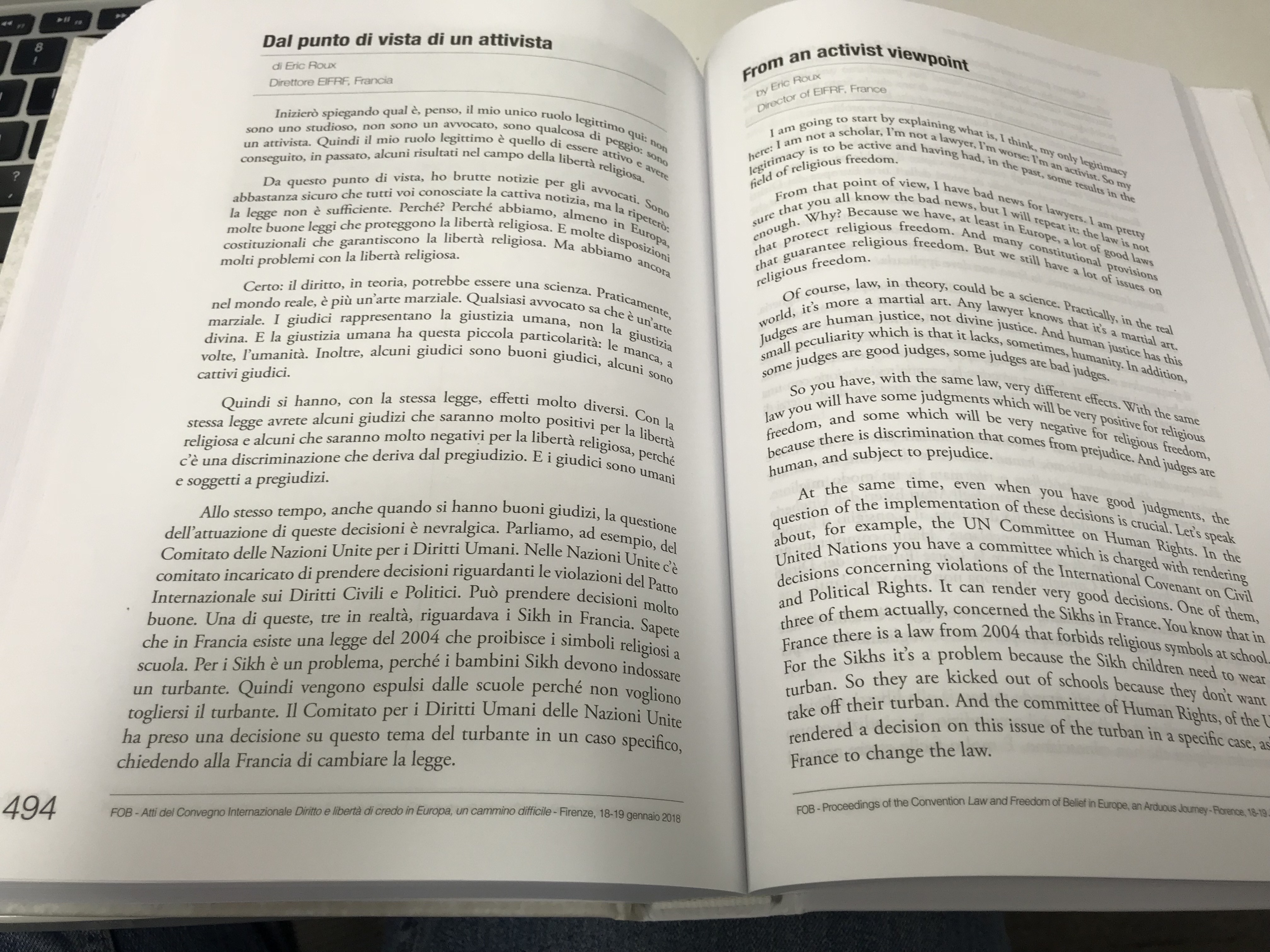Blog personnel - News - Religion - Scientology - Droits de l'Homme - Interviews - Livres - etc.
Eric Roux

Ministre du culte de L'Eglise de Scientology, après 30 années passées dans le clergé de l'Eglise, Eric Roux est aujourd'hui le président de l'Union des Eglises de Scientology de France et Vice Président du Bureau Européen de L'Eglise de Scientology pour les affaires publiques et les droits de l'homme. Il est aussi Président élu du Conseil International de URI (United Religions Initiative) et le Président du European Interreligious Forum for Religious Freedom.
Ce blog est une initiative personnelle destinée aux gens qui s'intéressent à la spiritualité, ou à ceux qui souhaitent en apprendre plus sur la scientology, à ceux qui pensent que la liberté de conscience est un droit fondamental qui mérite d'être défendu, à mes coreligionnaires ou encore à ceux qui sont curieux...
Ce blog est une initiative personnelle destinée aux gens qui s'intéressent à la spiritualité, ou à ceux qui souhaitent en apprendre plus sur la scientology, à ceux qui pensent que la liberté de conscience est un droit fondamental qui mérite d'être défendu, à mes coreligionnaires ou encore à ceux qui sont curieux...
Le livre "Law and Freedom of belief in Europe, an Arduous Journey", ou "Diritto e Libertà di Credo in Europa, un Camino Difficile ", vient de paraître aux éditions Pacini Giuridica. Il s'agit d'un ouvrage dans lequel tous les articles sont en deux langues, anglais et italien, qui retrace les interventions de nombreuses personnalités lors de la convention éponyme qui s'était tenue à Florence en janvier dernier, sous les auspices du Secrétaire Général du Conseil de l'Europe, sous le haut patronage de l'Assemblée Parlementaire de l'OSCE et du Président de la République Italienne. C'est donc tout naturellement qu'on y trouvera à la page 492 la retranscription de mon intervention.
Pour ceux qui parlent anglais, voici le texte de mon intervention tel qu'on le trouve dans ce livre :
Eric Roux
19 janvier 2018 - Florence, Italie
I am going to start by explaining what is, I think, my only legitimacy here: I am not a scholar, I'm not a lawyer, I'm worst: I'm an activist. So my legitimacy is to be active and having had, in the past, some results in the field of religious freedom.
From that point of view, I have bad news for lawyers. I am pretty sure that you all know the bad news, but I will repeat it: the law is not enough. Why? Because we have, at least in Europe, a lot of good laws that protect religious freedom. And many constitutional provisions that guarantee religious freedom. But we still have a lot of issues on religious freedom.
Of course, law, in theory, could be a science. Practically, in the real world, it's more a martial art. Any lawyer knows that it's a martial art. Judges are human justice, not divine justice. And human justice has this small peculiarity which is that it lacks, sometimes, humanity. In addition, some judges are good judges, some judges are bad judges.
So you have, with the same law, very different effects. With the same law you will have some judgments which will be very positive for religious freedom, and some which will be very negative for religious freedom, because there is discrimination that comes from prejudice. And judges are human, and subject to prejudice.
At the same time, even when you have good judgments, the question of the implementation of these decisions is crucial. Let's speak about, for example, the UN Committee on Human Rights. In the United Nations you have a committee which is charged with rendering decisions concerning violations of the International Covenant on Civil and Political Rights. It can render very good decisions. One of them, three of them actually, concerned the Sikhs in France. You know that in France there is a law from 2004 that forbids religious symbols at school. For the Sikhs it's a problem because the Sikh children need to wear a turban. So they are kicked out from schools because they don't want to take off their turban. And the committee of Human Rights, of the UN, rendered a decision on this issue of the turban in a specific case, asking France to change the law.
This Covenant has been signed and ratified by France, but the doctrine also says that the decisions of the Committee are not really binding. Of course, if you say to a State, “you know we render a decision but it's not really binding”, you can be sure that the State will not do anything with it. In that case the consequence is that the 2004 law is still exactly the same and the Sikhs still have the same problem.
Pour ceux qui parlent anglais, voici le texte de mon intervention tel qu'on le trouve dans ce livre :
Eric Roux
19 janvier 2018 - Florence, Italie
I am going to start by explaining what is, I think, my only legitimacy here: I am not a scholar, I'm not a lawyer, I'm worst: I'm an activist. So my legitimacy is to be active and having had, in the past, some results in the field of religious freedom.
From that point of view, I have bad news for lawyers. I am pretty sure that you all know the bad news, but I will repeat it: the law is not enough. Why? Because we have, at least in Europe, a lot of good laws that protect religious freedom. And many constitutional provisions that guarantee religious freedom. But we still have a lot of issues on religious freedom.
Of course, law, in theory, could be a science. Practically, in the real world, it's more a martial art. Any lawyer knows that it's a martial art. Judges are human justice, not divine justice. And human justice has this small peculiarity which is that it lacks, sometimes, humanity. In addition, some judges are good judges, some judges are bad judges.
So you have, with the same law, very different effects. With the same law you will have some judgments which will be very positive for religious freedom, and some which will be very negative for religious freedom, because there is discrimination that comes from prejudice. And judges are human, and subject to prejudice.
At the same time, even when you have good judgments, the question of the implementation of these decisions is crucial. Let's speak about, for example, the UN Committee on Human Rights. In the United Nations you have a committee which is charged with rendering decisions concerning violations of the International Covenant on Civil and Political Rights. It can render very good decisions. One of them, three of them actually, concerned the Sikhs in France. You know that in France there is a law from 2004 that forbids religious symbols at school. For the Sikhs it's a problem because the Sikh children need to wear a turban. So they are kicked out from schools because they don't want to take off their turban. And the committee of Human Rights, of the UN, rendered a decision on this issue of the turban in a specific case, asking France to change the law.
This Covenant has been signed and ratified by France, but the doctrine also says that the decisions of the Committee are not really binding. Of course, if you say to a State, “you know we render a decision but it's not really binding”, you can be sure that the State will not do anything with it. In that case the consequence is that the 2004 law is still exactly the same and the Sikhs still have the same problem.
But even the European Court of Human Rights decisions are sometimes problematic. Everybody knows that they are completely binding. Let’s take examples in order to understand the problem: you will know Russia does not implement some of the decisions of the European Court of Human Rights. More than that: three years ago, they voted in a law that states that when there is a decision from the European Court of Human Rights, this decision can be submitted by the State to the Russian Constitutional Court and the Constitutional Court can rule on whether the European Court’s decision is correct or not and complies with the constitution of the Russian Federation, and if not, then the State does not have to apply it.
This is Russia, but even in the European Union: there is Hungary. Hungary changed their religion law in 2011 and they deregistered hundreds of religious movements in Hungary. These movements could not register again because it's very complicated as there are many disproportionally difficult steps the group has to pass through and in addition any movement now needs to have their proposed registration submitted to a vote of the Parliament and obtain the acceptance of two thirds of it in order to be registered.
So several religious movements went before the European Court of Human Rights, they won, and the decision was that this law was to be cancelled or reformed in a better way. Unfortunately, the answer from the Ministry of Foreign Affairs of Hungary was: "Oh, you know, this is Council of Europe, and Council of Europe is not European Union, so it's not binding." They completely invented a new way to consider the European Court of Human Rights: that decisions of the Council of Europe are not binding.
That is to say, even if we have good laws, there is a lot to do to make these laws effective. This is an important point if we want to fight for religious freedom
We need to understand what the biggest threat to religious freedom is. And I think I won't be wrong if I say that it is prejudice. Prejudice against religious movements we do not know. It's very easy to be negative towards a movement that everybody has a prejudice against. If you say that a movement is a "cult" or a "sect", well, nobody will tell you that you are doing something wrong if you attack them. And it works also for Muslims: today in many countries of Europe, if you say that somebody is a "Salafist", it's exactly the same as if you said that he is a "terrorist". I am not saying that it's the truth or not. I'm saying that in the minds of some people it's exactly the same. So there is significant prejudice because these people will speak negatively about "cults", "Salafists", "Islam terrorism" and other prejudices when they do not know anything about these movements.
It's not a question of thinking that this or that movement is good or bad. This would be opinion. I'm talking about facts. So prejudice is a very big problem. And, of course, medias are the first vector of prejudice. Now the good news with the media is that they are very weak in terms of influencing people. That being said, whilst it may be weak when there is no information, even this will be what people will listen to. If you have no information on the movement and the press says something, people will listen to the press.
That is why we need a force stronger than the medias. This is not very difficult, but it needs to be done to fill the vacuum and, with filling the vacuum, getting rid of the prejudice.
I would like to tell you a little story. Not a very important story, because it's a story which takes place actually in a Turkish fast food. I was in Brussels in a Turkish fast-food and it was the day of the terrorist attacks in Paris. I was waiting for my sandwich and the guy who was supposed to make my sandwich was looking at the TV. They were speaking about the attacks, and he was completely upset. He was upset of course because of the people killed in the attacks, but also because he was a Muslim and he was saying: "You know, it's horrible. Now people will hate us even more than before, and because of these terrorists we as Muslims are going to be discriminated against more." He was completely and sincerely upset.
I told him: "You know, don't think that everyone is doing the mistake to confuse Islam and terrorism. It's not true. Maybe the medias want you to think that, maybe people tell you that, but it's not true." And I added: "I'm fighting for the rights of people to have their own faith and I will fight for your rights. Every day of my life I spend time saying, when people wrongly think of your religion, that it is not the truth and that they should learn more."
He was suddenly very happy with that. I gave him my card of the European Interreligious Forum for Religious Freedom, and he said. "Are you a Muslim?" I said: "No, I'm not a Muslim." He said: "Well what are you?" and I answered: "I'm a Scientologist". Then he looked at me and he said: "You know what? You Scientologists, you are very good guys, I will spread it everywhere!"
Then I walked away and I went back to my Scientology community and I told my fellow Scientologists: "Do you feel discriminated sometimes?" They said: "Yes!" I said: "Well, you should start defending Islam." They said: "Why?" I said: "Because if you defend Islam, at least, the Muslims that you will defend and their friends will think that you are good people. It will be better, won’t it? If you defend yourself nobody will think that you are good people. If you defend them at least they will think that."
Then I went to the Muslims and I said: "Have you ever defended a Scientologist?" The ones I met that day said: "No, why?" I answered: "Because if you do that, I can tell you, I will tell it to the Scientologists I know and they will think that Muslims are good." And of course it works for everyone.
Why do I say that? Very simply because religious freedom is not a matter of what is your faith. Religious freedom is a matter of humanity. And you need to be willing to defend the religious freedom of other people of different faiths, you know, if you want to have an effect. And it has a practical effect. As I said: if everyone was defending the right to religious freedom of others, there would be no more problem of religious freedom on earth. Because together we are much stronger.
Besides that, practically speaking: if you want to win a legal case which is related to religious affiliation, whether you are a religious movement or somebody who has trouble with justice based on religious affiliation, you can’t do it if you are alone. But it's very possible if you are allied with others. And in European Union as well as in greater Europe, we all know that there are problems of religious freedom. And these problems of religious freedom could be overcome only if there is an alliance, an alliance with religions altogether, an alliance of religions with scholars, an alliance of religious scholars with politicians who care about religious freedom, etc. It's much more powerful than trying to do something alone.
That's my experience in the field of religious freedom for years now, and it's an experience that is based on how do you win and how do you lose. Actually, I prefer to win. And small wins, at the end, will guarantee religious freedom for all. Of course when you do it, you do not do it for your own interest: you do it for the common good, you do it because you believe in religious freedom and this is the basis of this fight for religious freedom.
So, to conclude, I would say that I'm very thankful to be here. I wanted to give this message not because it's a very intellectual one, it's more a practical one and it can change, if we do that, the face of Europe regarding religious freedom.
This is Russia, but even in the European Union: there is Hungary. Hungary changed their religion law in 2011 and they deregistered hundreds of religious movements in Hungary. These movements could not register again because it's very complicated as there are many disproportionally difficult steps the group has to pass through and in addition any movement now needs to have their proposed registration submitted to a vote of the Parliament and obtain the acceptance of two thirds of it in order to be registered.
So several religious movements went before the European Court of Human Rights, they won, and the decision was that this law was to be cancelled or reformed in a better way. Unfortunately, the answer from the Ministry of Foreign Affairs of Hungary was: "Oh, you know, this is Council of Europe, and Council of Europe is not European Union, so it's not binding." They completely invented a new way to consider the European Court of Human Rights: that decisions of the Council of Europe are not binding.
That is to say, even if we have good laws, there is a lot to do to make these laws effective. This is an important point if we want to fight for religious freedom
We need to understand what the biggest threat to religious freedom is. And I think I won't be wrong if I say that it is prejudice. Prejudice against religious movements we do not know. It's very easy to be negative towards a movement that everybody has a prejudice against. If you say that a movement is a "cult" or a "sect", well, nobody will tell you that you are doing something wrong if you attack them. And it works also for Muslims: today in many countries of Europe, if you say that somebody is a "Salafist", it's exactly the same as if you said that he is a "terrorist". I am not saying that it's the truth or not. I'm saying that in the minds of some people it's exactly the same. So there is significant prejudice because these people will speak negatively about "cults", "Salafists", "Islam terrorism" and other prejudices when they do not know anything about these movements.
It's not a question of thinking that this or that movement is good or bad. This would be opinion. I'm talking about facts. So prejudice is a very big problem. And, of course, medias are the first vector of prejudice. Now the good news with the media is that they are very weak in terms of influencing people. That being said, whilst it may be weak when there is no information, even this will be what people will listen to. If you have no information on the movement and the press says something, people will listen to the press.
That is why we need a force stronger than the medias. This is not very difficult, but it needs to be done to fill the vacuum and, with filling the vacuum, getting rid of the prejudice.
I would like to tell you a little story. Not a very important story, because it's a story which takes place actually in a Turkish fast food. I was in Brussels in a Turkish fast-food and it was the day of the terrorist attacks in Paris. I was waiting for my sandwich and the guy who was supposed to make my sandwich was looking at the TV. They were speaking about the attacks, and he was completely upset. He was upset of course because of the people killed in the attacks, but also because he was a Muslim and he was saying: "You know, it's horrible. Now people will hate us even more than before, and because of these terrorists we as Muslims are going to be discriminated against more." He was completely and sincerely upset.
I told him: "You know, don't think that everyone is doing the mistake to confuse Islam and terrorism. It's not true. Maybe the medias want you to think that, maybe people tell you that, but it's not true." And I added: "I'm fighting for the rights of people to have their own faith and I will fight for your rights. Every day of my life I spend time saying, when people wrongly think of your religion, that it is not the truth and that they should learn more."
He was suddenly very happy with that. I gave him my card of the European Interreligious Forum for Religious Freedom, and he said. "Are you a Muslim?" I said: "No, I'm not a Muslim." He said: "Well what are you?" and I answered: "I'm a Scientologist". Then he looked at me and he said: "You know what? You Scientologists, you are very good guys, I will spread it everywhere!"
Then I walked away and I went back to my Scientology community and I told my fellow Scientologists: "Do you feel discriminated sometimes?" They said: "Yes!" I said: "Well, you should start defending Islam." They said: "Why?" I said: "Because if you defend Islam, at least, the Muslims that you will defend and their friends will think that you are good people. It will be better, won’t it? If you defend yourself nobody will think that you are good people. If you defend them at least they will think that."
Then I went to the Muslims and I said: "Have you ever defended a Scientologist?" The ones I met that day said: "No, why?" I answered: "Because if you do that, I can tell you, I will tell it to the Scientologists I know and they will think that Muslims are good." And of course it works for everyone.
Why do I say that? Very simply because religious freedom is not a matter of what is your faith. Religious freedom is a matter of humanity. And you need to be willing to defend the religious freedom of other people of different faiths, you know, if you want to have an effect. And it has a practical effect. As I said: if everyone was defending the right to religious freedom of others, there would be no more problem of religious freedom on earth. Because together we are much stronger.
Besides that, practically speaking: if you want to win a legal case which is related to religious affiliation, whether you are a religious movement or somebody who has trouble with justice based on religious affiliation, you can’t do it if you are alone. But it's very possible if you are allied with others. And in European Union as well as in greater Europe, we all know that there are problems of religious freedom. And these problems of religious freedom could be overcome only if there is an alliance, an alliance with religions altogether, an alliance of religions with scholars, an alliance of religious scholars with politicians who care about religious freedom, etc. It's much more powerful than trying to do something alone.
That's my experience in the field of religious freedom for years now, and it's an experience that is based on how do you win and how do you lose. Actually, I prefer to win. And small wins, at the end, will guarantee religious freedom for all. Of course when you do it, you do not do it for your own interest: you do it for the common good, you do it because you believe in religious freedom and this is the basis of this fight for religious freedom.
So, to conclude, I would say that I'm very thankful to be here. I wanted to give this message not because it's a very intellectual one, it's more a practical one and it can change, if we do that, the face of Europe regarding religious freedom.
Eric Roux





Liberté de conscience
Commentaires (0) | Permalien